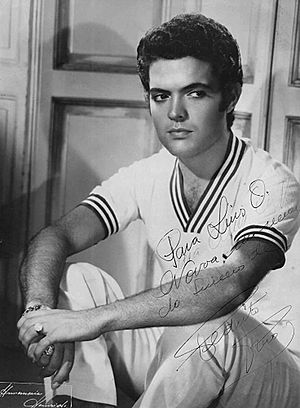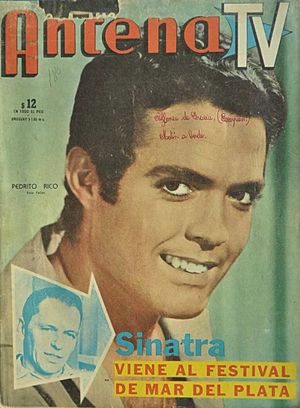Pedrito Rico facts for kids
Pedro Rico Cutillas, known to many as Pedrito Rico, was a famous Spanish singer, dancer, and actor. He was born on September 7, 1932, in Elda, Alicante, Spain, and passed away on June 21, 1988, in Barcelona. Pedrito Rico spent a large part of his successful career performing in Argentina.
Contents
Early Life and Career Beginnings
Pedrito Rico started his career in Spain. In 1955, he first performed at the Ruzafa Theater in Valencia. Soon after, he moved to the Price Theater in Madrid. His talent quickly caught the eye of an Argentine theater manager.
In 1956, he was invited to perform in Buenos Aires, Argentina. He appeared at the Avenida Theater, a well-known place for Spanish musical shows called zarzuelas. This theater was in an area with a large Spanish community, and Pedrito Rico quickly became very popular there.
Rise to Fame and "The Angel of Spain"
Pedrito Rico's performances were a big hit in Argentina. People loved him so much that they called him "El Ángel de España," which means "The Angel of Spain." This nickname later became the title of one of his movies.
He was known for his amazing voice and great dancing skills. He sang many types of Spanish songs, including flamenco and melodic tunes. He also adapted some tropical songs to his unique style. In 1958, he received a Golden Record award in Cuba and the Guaicaipuro award in Venezuela. These awards recognized him as the best international singer.
Pedrito Rico always worked hard to make sure his shows were perfect. He was famous for his colorful outfits and special stage makeup. He filled theaters wherever he performed, and his songs were loved by many.
Later Years and Legacy
Pedrito Rico continued to perform and record many albums. Some of his most famous songs include "La Campanera," "Dos Cruces," and "Mi Escapulario." His movie "The Angel of Spain" helped him become even more popular across Latin America.
In 1980, Pedrito Rico was honored with the Medal of Merit at Work. This award recognized his dedication to Spanish folk music.
He passed away in Barcelona on June 21, 1988, after a period of illness. His passing was a sad moment for his fans, especially in his hometown of Elda. His body was brought back to Elda, where many friends and admirers gathered to pay their respects.
Pedrito Rico often spent his summers in Elda or in the town of Benidorm, both in Alicante, where he had a house. He also had a home in Buenos Aires, which was his main base for most of the year.
Filmography
Pedrito Rico also starred in several films during his career:
- Vestida de novia (1966)
- Buenas noches, Buenos Aires (1964)
- Feria en Sevilla (1962)
- Venga a bailar el rock (1957)
- El ángel de España (1957)
See also
 In Spanish: Pedrito Rico para niños
In Spanish: Pedrito Rico para niños
 | Mary Eliza Mahoney |
 | Susie King Taylor |
 | Ida Gray |
 | Eliza Ann Grier |



